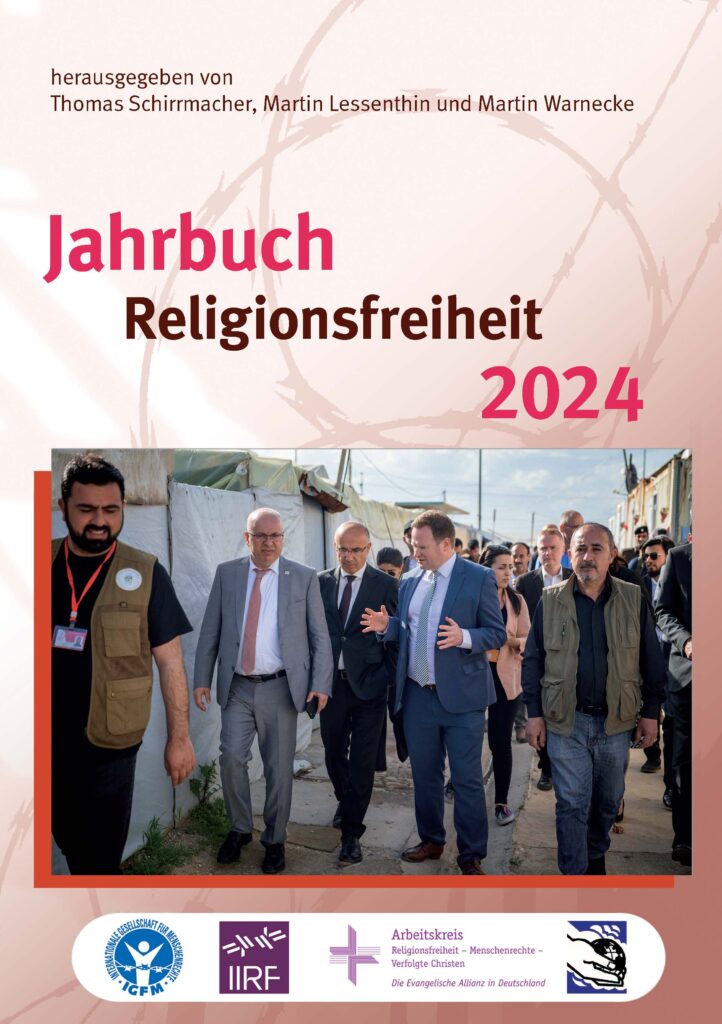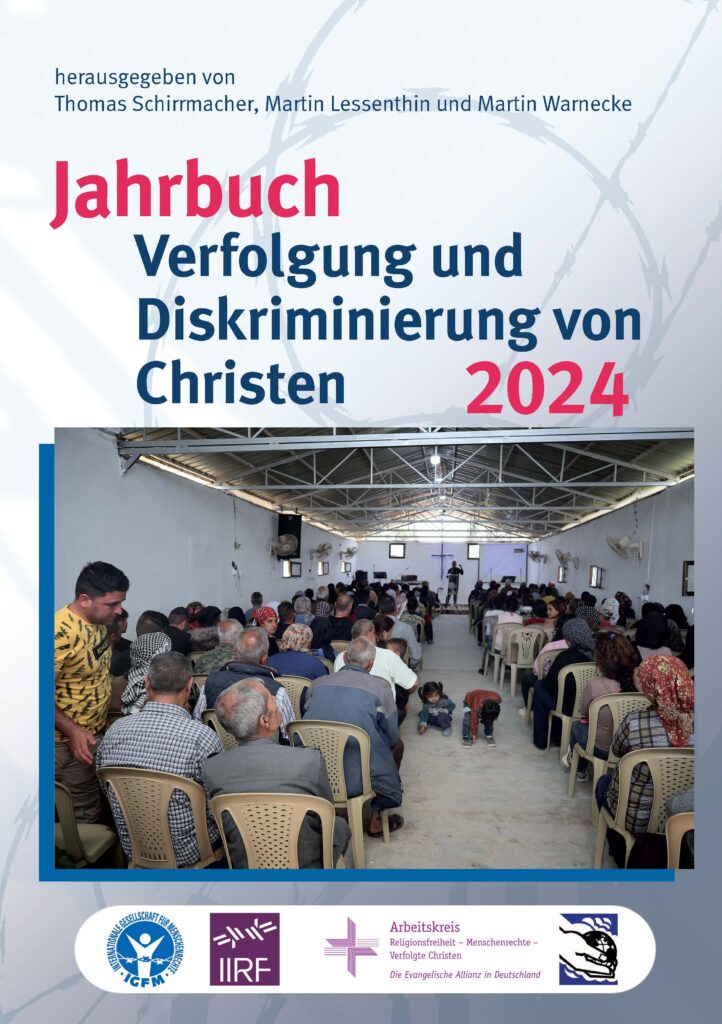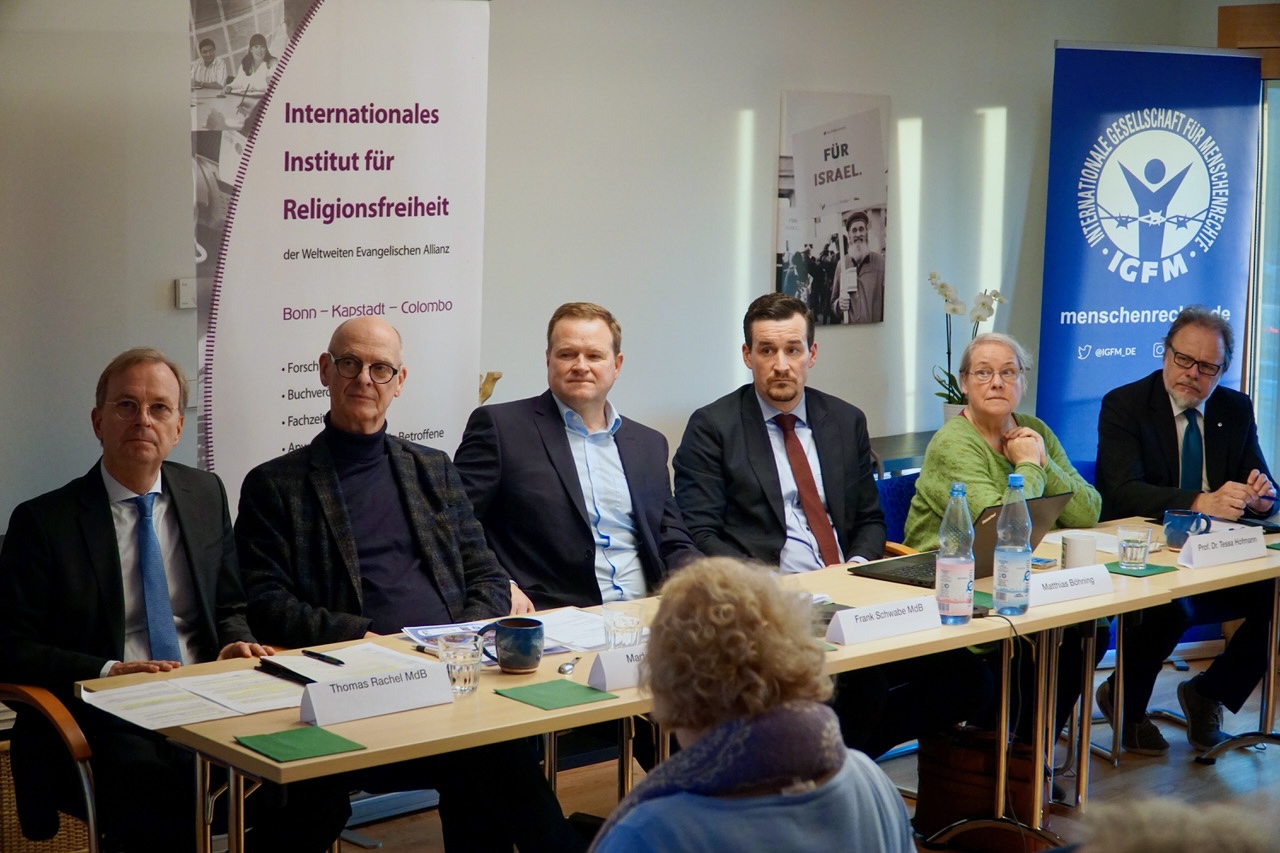Yearbooks ‘Religious Freedom 2024’ and ‘Persecution and Discrimination against Christians 2024’ presented in Berlin
(Bonn 05.12.2024) “There is practically no socially relevant issue that does not play a role in religious freedom. In hardly any region of the world has the situation regarding religious freedom and human rights improved compared to ten years ago. Unfortunately, the opposite is the case,” explained Prof. Dr. Thomas Schirrmacher at the launch of the yearbooks ‘Religious Freedom 2024’ and ‘Persecution and Discrimination of Christians 2024’ in Berlin today. Schirrmacher is President of the International Society for Human Rights (ISHR) and co-founder and co-editor of the yearbooks.
 Human rights experts are particularly concerned about developments in the Middle East with their impact on Europe, Turkey and Germany in particular. Other hotspots are Africa, India and China. “We know much more today than we did ten years ago and can record and neutrally analyse fates and facts worldwide. The yearbooks and the new ‘Violent Incidents Database’ of the International Institute for Religious Freedom document this in an up-to-date and diverse way. Politicians and the media can draw on this information,” Schirrmacher continued.
Human rights experts are particularly concerned about developments in the Middle East with their impact on Europe, Turkey and Germany in particular. Other hotspots are Africa, India and China. “We know much more today than we did ten years ago and can record and neutrally analyse fates and facts worldwide. The yearbooks and the new ‘Violent Incidents Database’ of the International Institute for Religious Freedom document this in an up-to-date and diverse way. Politicians and the media can draw on this information,” Schirrmacher continued.
The Chairman of the German Evangelical Alliance, Frank Heinrich, pointed out the misuse of religion for political and geostrategic goals: “An example of the reverse instrumentalisation of religion can be found in Turkish President Erdogan’s long-standing and ever-increasing anti-Jewish and anti-Israeli hatred. This is not a new phenomenon; his attitude was already evident in 2010 in connection with the Gaza flotilla that left Istanbul for Gaza. Today more than ever, however, his hostile and hateful attitudes seem to be paying off in terms of domestic politics. Violence and hate crimes against Jews and Muslims are being more publicly recognised. But there is also a growing number of hate crimes against Christians in Europe.”
China’s role in the repression of believers, blasphemy laws in India and Islamic states as well as anti-conversion laws have become major threats to the human right to religious self-determination. Russia also posed new threats to religious freedom.
“Dictators learn from other dictators. They are afraid of religious freedom and human rights and are updating their methods to intimidate critics or cover up human rights violations. Dossiers and blacklists on politicians and human rights defenders that publicise the fate of victims and other persecuted people seem to have become standard practice. Threats, criminalisation and abuse of Interpol searches as well as entry bans are also part of the repertoire,” explained Martin Lessenthin, human rights expert and co-editor of the Yearbooks.
The number of persecuted Christians has steadily increased in recent years
Volker Kauder, the long-standing chairman of the CDU/CSU parliamentary group in the Bundestag, declared: “There is no justification for a war of aggression on the sovereignty of another country. By advocating this war, the Russian Orthodox Church is undermining Christian morality. Freedom of religion basically protects every religion and every belief without making any judgements. Defining a belief as correct leads to great pressure of persecution, especially for Christians, particularly in Islamic states.”
The Director of European Advocacy at ADF International, Dr. Felix Böllmann, explained: “Although international law guarantees religious freedom for all almost universally, many governments around the world are failing to uphold this right. In India, Pakistan and many South East Asian countries, draconian anti-conversion laws are routinely abused to target Christians. Attacks and violence are often the result—whether by the state or by violent mobs. But even in Europe, so-called ‘hate speech’ laws are increasingly leading to restrictions on the expression of faith. Their deterrent effect favours self-censorship and silences people, with serious consequences for the social climate, religious communities and personal beliefs.
 Christians are the most persecuted faith community in the world. ADF International advocates for justice for those who suffer persecution. At the same time, it is crucial that the international community does not accept violations of religious freedom, no matter where they occur.”
Christians are the most persecuted faith community in the world. ADF International advocates for justice for those who suffer persecution. At the same time, it is crucial that the international community does not accept violations of religious freedom, no matter where they occur.”
“The Kurdish Christians of Afrin feel abandoned by the rest of the world, especially by states like Germany that invoke their Judeo-Christian heritage. Around 1,200 of them still live in tents and celebrate their church services in a shack in no man’s land in north-west Syria, not far from Aleppo. In 2018, they were forced to flee from the Turkish army and its Islamist mercenaries. Even in their tents, they are attacked almost daily by Turkey, including with combat drones,” says Dr. Kamal Sido, Middle East Consultant at the Society for Threatened Peoples.
Lizzie Francis, Legal Counsel at ADF International, added with regard to Egypt: “Although there have been some positive developments in terms of religious freedom in Egypt in recent years, the situation for Christians and religious minorities remains dire. There are severe restrictions on freedom of speech, religious conversion and family life for religious minorities, and the many attacks on Christian communities by Islamist extremists are not adequately responded to by law enforcement. Egypt is thus becoming an increasingly hostile country for Christians who want to pass on their faith, or for Christian families who want to protect their daughters from forced marriages to older Muslim men. Everyone should have the right to live out their religious beliefs in freedom, without fear of reprisals from the state or exploitation by others in their communities.”
And the Coptic human rights activist and lawyer, Tamer Hannah, added: “Conversion to Islam in Egypt is a simple process that only takes a few hours: you sign a document and are immediately recognised as a Muslim and enjoy the protection of both the police and the Islamic groups. In contrast, converting from Islam to Christianity is almost impossible. Even converted Muslims who want to return to Christianity face severe repercussions under Islamic law, including the threat of death as prescribed in their interpretation of the Koran.”
“The Federal Foreign Office must revise the country reports on Egypt; anyone who, like Ms. Baerbock, talks about a value-based foreign policy must not give a brutal regime a ‘discount’ on human rights violations. This must also be reflected in the so-called asylum and deportation-relevant country reports of the Federal Foreign Office,” said the CDU/CSU’s spokesperson on human rights, Michael Brand MdB, adding: “In the case of Egypt, economic cooperation means that billions of German taxpayers’ money is being channelled there. We cannot bake our way around the world, and we must always keep an eye on the people and the geopolitical situation. However, we can’t reward those who openly trample on our ideas with massive amounts of money; a minimum level of respect must be expected; the same would apply the other way round, and we also treat our difficult partners with respect.”
No world peace without religious peace
The Federal Chairman of the Protestant Working Group of the CDU, Thomas Rachel MdB, said: “Especially in times of numerous violent conflicts, it is clear that there can be no world peace without religious peace. Properly understood, religions have the power to overcome conflicts and invite reconciliation. 85 per cent of the world’s population is religious. We should utilise the power of these people more! We should treat religious beliefs with respect and consideration. What concerns me deeply is that, on a global scale, Christians in particular are affected by defamation, discrimination and persecution. We must not be indifferent to this!”
The co-editor of the Yearbooks and historian, Martin Warnecke, recalled in this context: “Unfortunately, too many political actors—primarily from the secularised societies of the West—tend to underestimate the growing importance of religion worldwide. Families with a strong religious identity have more children on average than families with no religious affiliation. This simple fact alone should give pause for thought.” Warnecke continued: “If you look back in history, religion has almost always been a political factor. It’s no different today—you only have to open the newspaper. The yearbook aims to contribute to a better understanding of the major issues and trends of our time. A sober analysis is the prerequisite for any successful action.”
More resolute against anti-Semitism and genocide
The President of the German-Israeli Society, Volker Beck, called for more determination in the fight against anti-Semitism: “The all-time high of anti-Semitism requires a resolute and sustained response from democracies that are prepared to defend themselves. Anti-Semitism not only attacks the right to life of all Jews, but also represents a profound conspiracy theory that jeopardises the foundations of our open societies. In this worldview, state institutions and democracy are merely backdrops behind which the Jews are supposedly pulling the strings. This way of thinking is what makes anti-Semitism so dangerous and at the same time so difficult to combat.”
Thomas Schirrmacher adds in this context: “The current global situation disproves all those who deny a possible connection between anti-Semitic criticism of Israel and anti-Semitism itself. Most violent demonstrators around the world make no distinction between the two. They criticise Israel as a Jewish state, and their hatred of Jews turns into hatred of the only country with a Jewish majority. The increasing actual violence against Jews and the calls for violence against them hardly differentiate between Israel and the Jews. The slogan ‘From the river to the sea, Palestine will be free’ denies both a Jewish state in the Holy Land and the presence of Jews in the Holy Land. The slogan can only be fulfilled by killing Jews or forcibly expelling them.”
With regard to the Armenians in Azerbaijan, genocide researcher Prof. Dr. Tessa Hofmann said: “The irredentist concept of a ‘total Azerbaijan’ is also worrying. It has been the official state policy of Azerbaijan since September 2022 and is directed against the Republic of Armenia, among others, despite ongoing peace negotiations. At least 23 Armenians, including eight leaders of the former Republic of Artsakh, are still in Azerbaijani custody as prisoners of war and political hostages. Sanctions against those politically responsible in Azerbaijan as well as a criminal and international law investigation into the crimes against the Armenian population of Nagorno-Karabakh are therefore urgently needed.”
The Federal Government Commissioner for Freedom of Religion or Belief, Frank Schwabe MdB, stated: “The international right to freedom of religion or belief is being massively violated or called into question worldwide. Anyone who takes a look at this yearbook knows this. And new developments such as artificial intelligence are leading to new challenges internationally. All of this affects religious majorities and minorities as well as people who do not wish to follow any religion.”

The 2024 yearbooks
The ‘Yearbook on Persecution and Discrimination of Christians 2024’ (‘Jahrbuch Verfolgung und Diskriminierung von Christen 2024’) and the ‘Yearbook on Religious Freedom 2024’ (‘Jahrbuch Religionsfreiheit 2024’) are now available free of charge for download and for free distribution and provision on other websites.
The yearbooks are also made available to all members of the German Bundestag by the German Evangelical Alliance. A similar service is provided in Switzerland and Austria. Further copies can be requested for distribution to politicians and church leaders.
The yearbooks are published by the International Society for Human Rights (ISHR), the International Institute for Religious Freedom (IIRF) and the religious freedom working groups of the three German-speaking alliances: the German Evangelical Alliance, the Swiss Evangelical Alliance and the Austrian Evangelical Alliance.
The printed version was published on 5 December 2024 by Culture and Science Publishing (VKW). Both yearbooks are combined in a single reversible book. Both books are available from booksellers at a price of 14 euros.
Bibliographic information
- Thomas Schirrmacher, Martin Lessenthin and Martin Warnecke (eds.). Jahrbuch Verfolgung und Diskriminierung von Christen 2024. Studies on Religious Freedom. Vol. 41. Culture and Science Publishing (VKW): Bonn, 2024. ISBN 978-3-86269-306-1. Pb. 166 p.
- Thomas Schirrmacher, Martin Lessenthin and Martin Warnecke (eds.). Jahrbuch Religionsfreiheit 2024. Studies on Religious Freedom. Vol. 42. Culture and Science Publishing (VKW): Bonn, 2024. ISBN 978-3-86269-307-8. Pb. 378 S.
Source: https://bonn-profiles.net/u/7688